Strategies for Managing Cultural Differences
VerifiedAdded on 2021/04/21
|16
|3311
|51
AI Summary
This assignment requires analyzing the relationship between national culture and international human resource management. It involves identifying the challenges of cultural differences in multinational companies and proposing strategies to manage these differences effectively. The assignment also considers the importance of attractive rewards and compensation in motivating employees to adjust to different cultures.
Contribute Materials
Your contribution can guide someone’s learning journey. Share your
documents today.
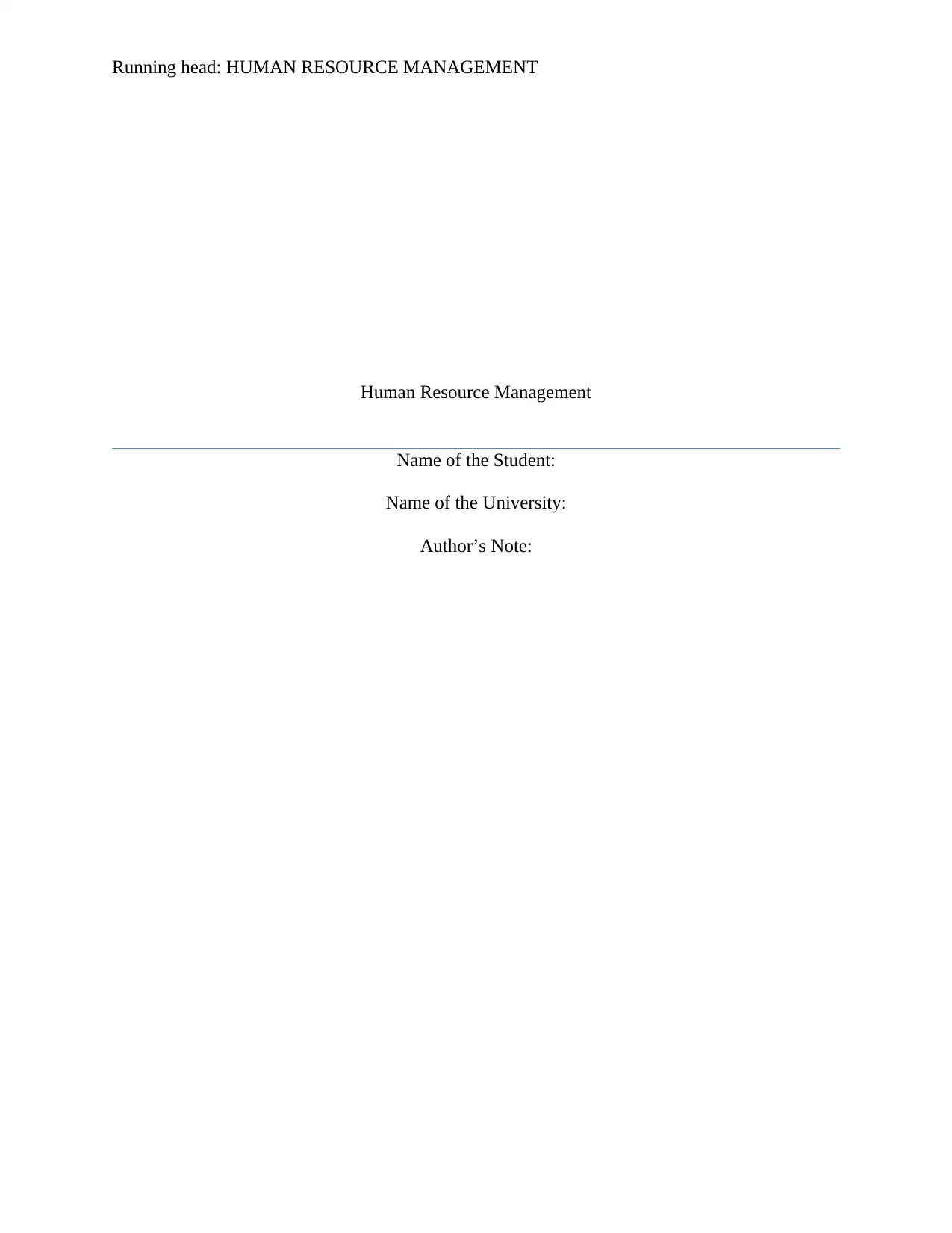
Running head: HUMAN RESOURCE MANAGEMENT
Human Resource Management
Name of the Student:
Name of the University:
Author’s Note:
Human Resource Management
Name of the Student:
Name of the University:
Author’s Note:
Secure Best Marks with AI Grader
Need help grading? Try our AI Grader for instant feedback on your assignments.
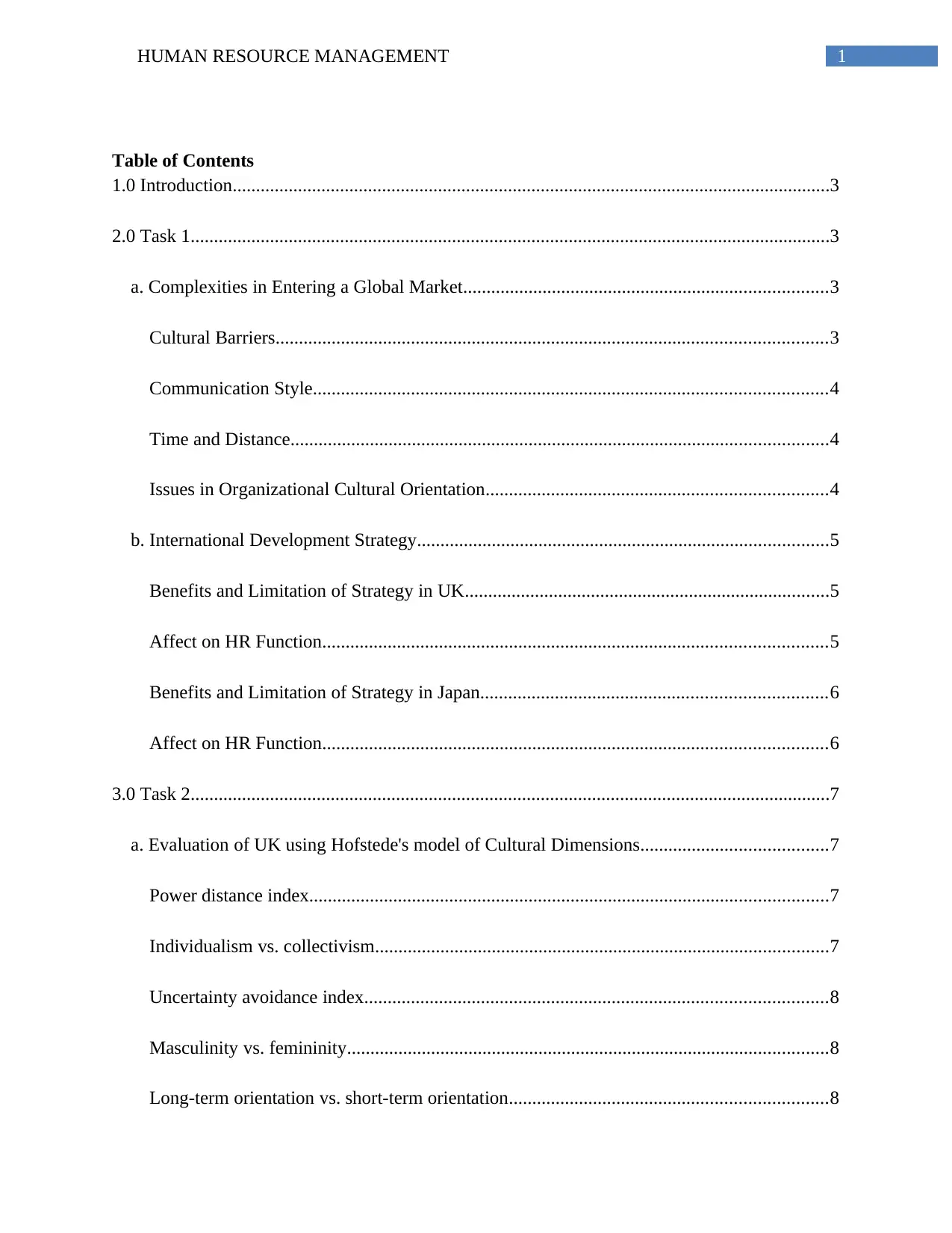
1HUMAN RESOURCE MANAGEMENT
Table of Contents
1.0 Introduction................................................................................................................................3
2.0 Task 1.........................................................................................................................................3
a. Complexities in Entering a Global Market..............................................................................3
Cultural Barriers......................................................................................................................3
Communication Style..............................................................................................................4
Time and Distance...................................................................................................................4
Issues in Organizational Cultural Orientation.........................................................................4
b. International Development Strategy........................................................................................5
Benefits and Limitation of Strategy in UK..............................................................................5
Affect on HR Function............................................................................................................5
Benefits and Limitation of Strategy in Japan..........................................................................6
Affect on HR Function............................................................................................................6
3.0 Task 2.........................................................................................................................................7
a. Evaluation of UK using Hofstede's model of Cultural Dimensions........................................7
Power distance index...............................................................................................................7
Individualism vs. collectivism.................................................................................................7
Uncertainty avoidance index...................................................................................................8
Masculinity vs. femininity.......................................................................................................8
Long-term orientation vs. short-term orientation....................................................................8
Table of Contents
1.0 Introduction................................................................................................................................3
2.0 Task 1.........................................................................................................................................3
a. Complexities in Entering a Global Market..............................................................................3
Cultural Barriers......................................................................................................................3
Communication Style..............................................................................................................4
Time and Distance...................................................................................................................4
Issues in Organizational Cultural Orientation.........................................................................4
b. International Development Strategy........................................................................................5
Benefits and Limitation of Strategy in UK..............................................................................5
Affect on HR Function............................................................................................................5
Benefits and Limitation of Strategy in Japan..........................................................................6
Affect on HR Function............................................................................................................6
3.0 Task 2.........................................................................................................................................7
a. Evaluation of UK using Hofstede's model of Cultural Dimensions........................................7
Power distance index...............................................................................................................7
Individualism vs. collectivism.................................................................................................7
Uncertainty avoidance index...................................................................................................8
Masculinity vs. femininity.......................................................................................................8
Long-term orientation vs. short-term orientation....................................................................8
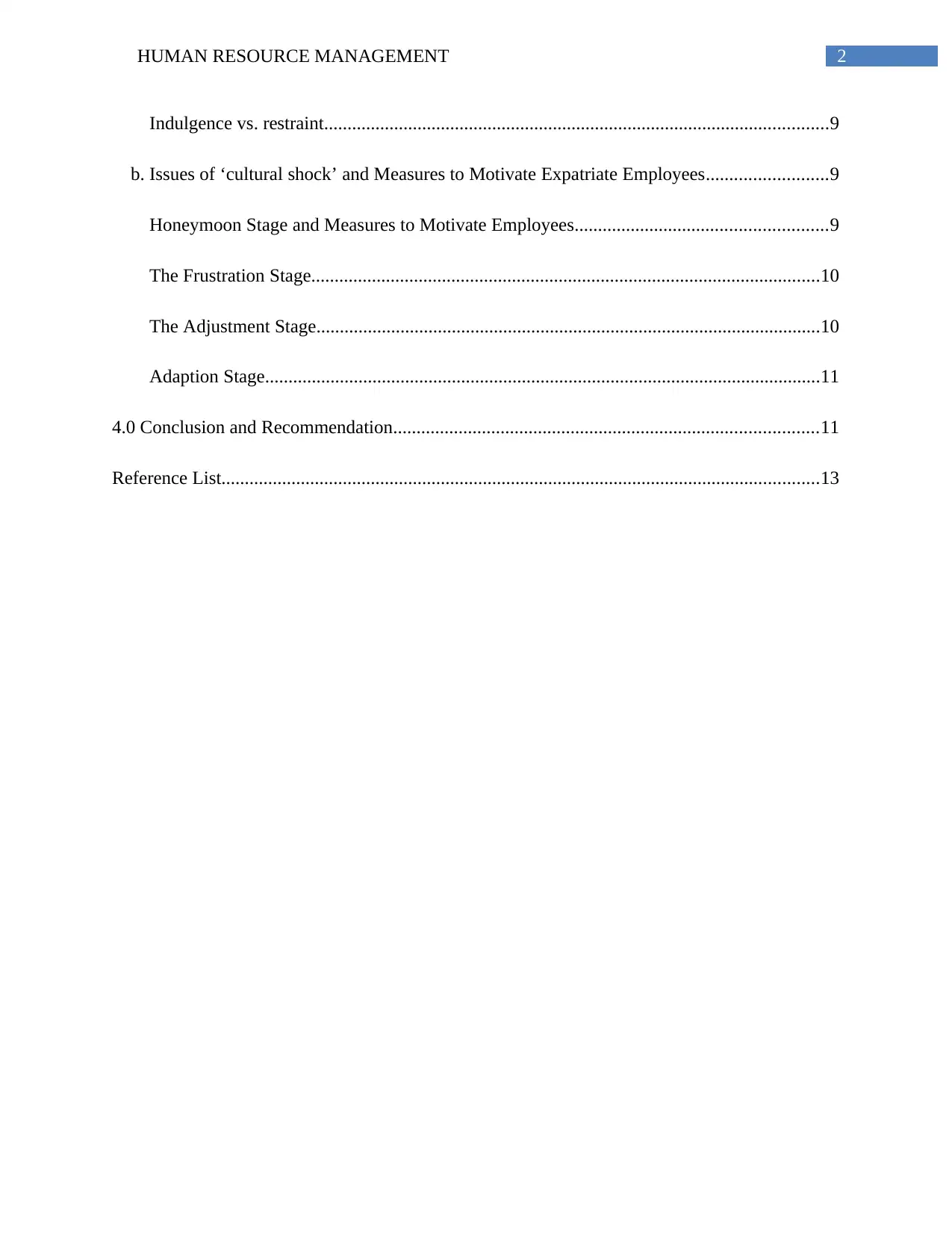
2HUMAN RESOURCE MANAGEMENT
Indulgence vs. restraint............................................................................................................9
b. Issues of ‘cultural shock’ and Measures to Motivate Expatriate Employees..........................9
Honeymoon Stage and Measures to Motivate Employees......................................................9
The Frustration Stage.............................................................................................................10
The Adjustment Stage............................................................................................................10
Adaption Stage.......................................................................................................................11
4.0 Conclusion and Recommendation...........................................................................................11
Reference List................................................................................................................................13
Indulgence vs. restraint............................................................................................................9
b. Issues of ‘cultural shock’ and Measures to Motivate Expatriate Employees..........................9
Honeymoon Stage and Measures to Motivate Employees......................................................9
The Frustration Stage.............................................................................................................10
The Adjustment Stage............................................................................................................10
Adaption Stage.......................................................................................................................11
4.0 Conclusion and Recommendation...........................................................................................11
Reference List................................................................................................................................13
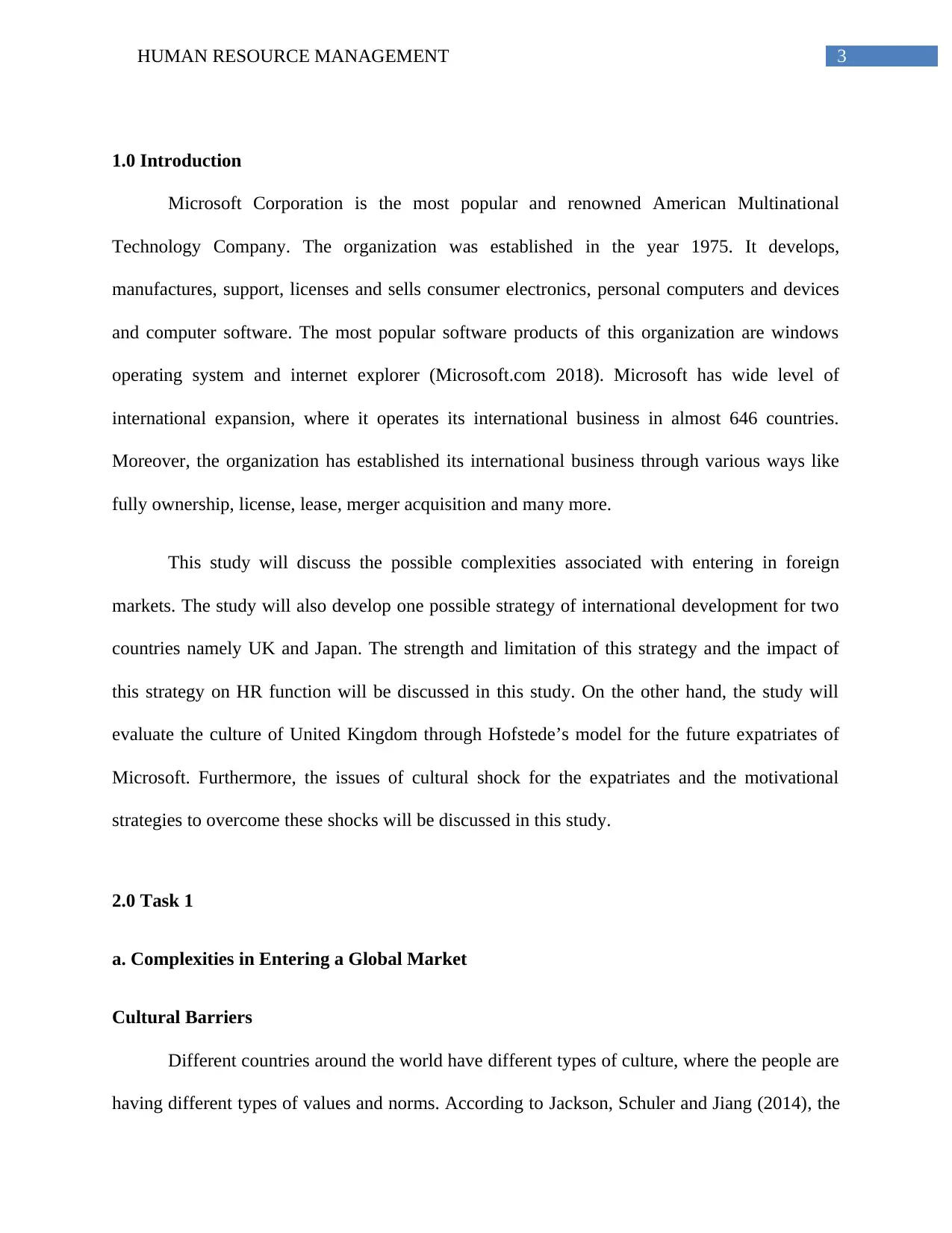
3HUMAN RESOURCE MANAGEMENT
1.0 Introduction
Microsoft Corporation is the most popular and renowned American Multinational
Technology Company. The organization was established in the year 1975. It develops,
manufactures, support, licenses and sells consumer electronics, personal computers and devices
and computer software. The most popular software products of this organization are windows
operating system and internet explorer (Microsoft.com 2018). Microsoft has wide level of
international expansion, where it operates its international business in almost 646 countries.
Moreover, the organization has established its international business through various ways like
fully ownership, license, lease, merger acquisition and many more.
This study will discuss the possible complexities associated with entering in foreign
markets. The study will also develop one possible strategy of international development for two
countries namely UK and Japan. The strength and limitation of this strategy and the impact of
this strategy on HR function will be discussed in this study. On the other hand, the study will
evaluate the culture of United Kingdom through Hofstede’s model for the future expatriates of
Microsoft. Furthermore, the issues of cultural shock for the expatriates and the motivational
strategies to overcome these shocks will be discussed in this study.
2.0 Task 1
a. Complexities in Entering a Global Market
Cultural Barriers
Different countries around the world have different types of culture, where the people are
having different types of values and norms. According to Jackson, Schuler and Jiang (2014), the
1.0 Introduction
Microsoft Corporation is the most popular and renowned American Multinational
Technology Company. The organization was established in the year 1975. It develops,
manufactures, support, licenses and sells consumer electronics, personal computers and devices
and computer software. The most popular software products of this organization are windows
operating system and internet explorer (Microsoft.com 2018). Microsoft has wide level of
international expansion, where it operates its international business in almost 646 countries.
Moreover, the organization has established its international business through various ways like
fully ownership, license, lease, merger acquisition and many more.
This study will discuss the possible complexities associated with entering in foreign
markets. The study will also develop one possible strategy of international development for two
countries namely UK and Japan. The strength and limitation of this strategy and the impact of
this strategy on HR function will be discussed in this study. On the other hand, the study will
evaluate the culture of United Kingdom through Hofstede’s model for the future expatriates of
Microsoft. Furthermore, the issues of cultural shock for the expatriates and the motivational
strategies to overcome these shocks will be discussed in this study.
2.0 Task 1
a. Complexities in Entering a Global Market
Cultural Barriers
Different countries around the world have different types of culture, where the people are
having different types of values and norms. According to Jackson, Schuler and Jiang (2014), the
Secure Best Marks with AI Grader
Need help grading? Try our AI Grader for instant feedback on your assignments.
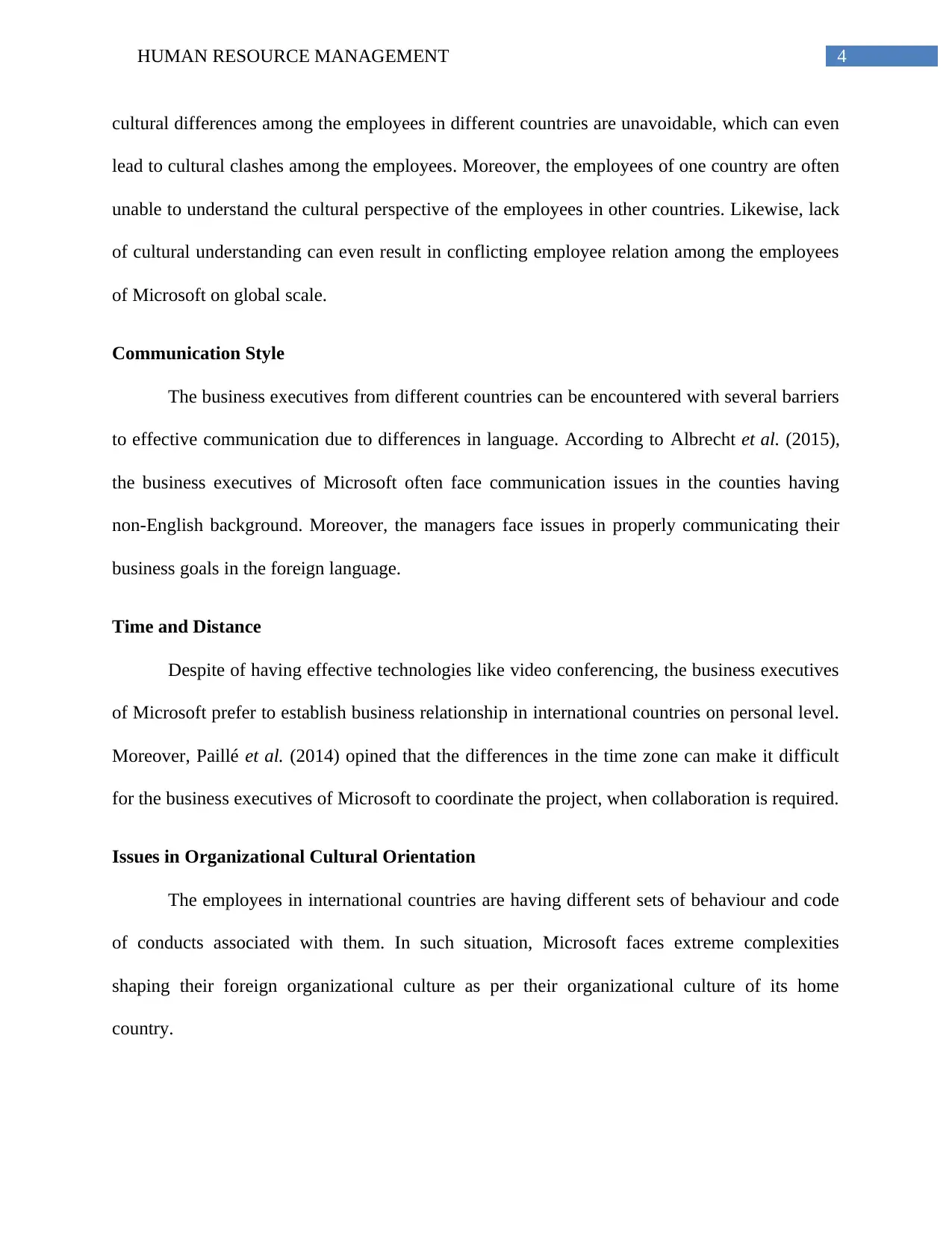
4HUMAN RESOURCE MANAGEMENT
cultural differences among the employees in different countries are unavoidable, which can even
lead to cultural clashes among the employees. Moreover, the employees of one country are often
unable to understand the cultural perspective of the employees in other countries. Likewise, lack
of cultural understanding can even result in conflicting employee relation among the employees
of Microsoft on global scale.
Communication Style
The business executives from different countries can be encountered with several barriers
to effective communication due to differences in language. According to Albrecht et al. (2015),
the business executives of Microsoft often face communication issues in the counties having
non-English background. Moreover, the managers face issues in properly communicating their
business goals in the foreign language.
Time and Distance
Despite of having effective technologies like video conferencing, the business executives
of Microsoft prefer to establish business relationship in international countries on personal level.
Moreover, Paillé et al. (2014) opined that the differences in the time zone can make it difficult
for the business executives of Microsoft to coordinate the project, when collaboration is required.
Issues in Organizational Cultural Orientation
The employees in international countries are having different sets of behaviour and code
of conducts associated with them. In such situation, Microsoft faces extreme complexities
shaping their foreign organizational culture as per their organizational culture of its home
country.
cultural differences among the employees in different countries are unavoidable, which can even
lead to cultural clashes among the employees. Moreover, the employees of one country are often
unable to understand the cultural perspective of the employees in other countries. Likewise, lack
of cultural understanding can even result in conflicting employee relation among the employees
of Microsoft on global scale.
Communication Style
The business executives from different countries can be encountered with several barriers
to effective communication due to differences in language. According to Albrecht et al. (2015),
the business executives of Microsoft often face communication issues in the counties having
non-English background. Moreover, the managers face issues in properly communicating their
business goals in the foreign language.
Time and Distance
Despite of having effective technologies like video conferencing, the business executives
of Microsoft prefer to establish business relationship in international countries on personal level.
Moreover, Paillé et al. (2014) opined that the differences in the time zone can make it difficult
for the business executives of Microsoft to coordinate the project, when collaboration is required.
Issues in Organizational Cultural Orientation
The employees in international countries are having different sets of behaviour and code
of conducts associated with them. In such situation, Microsoft faces extreme complexities
shaping their foreign organizational culture as per their organizational culture of its home
country.
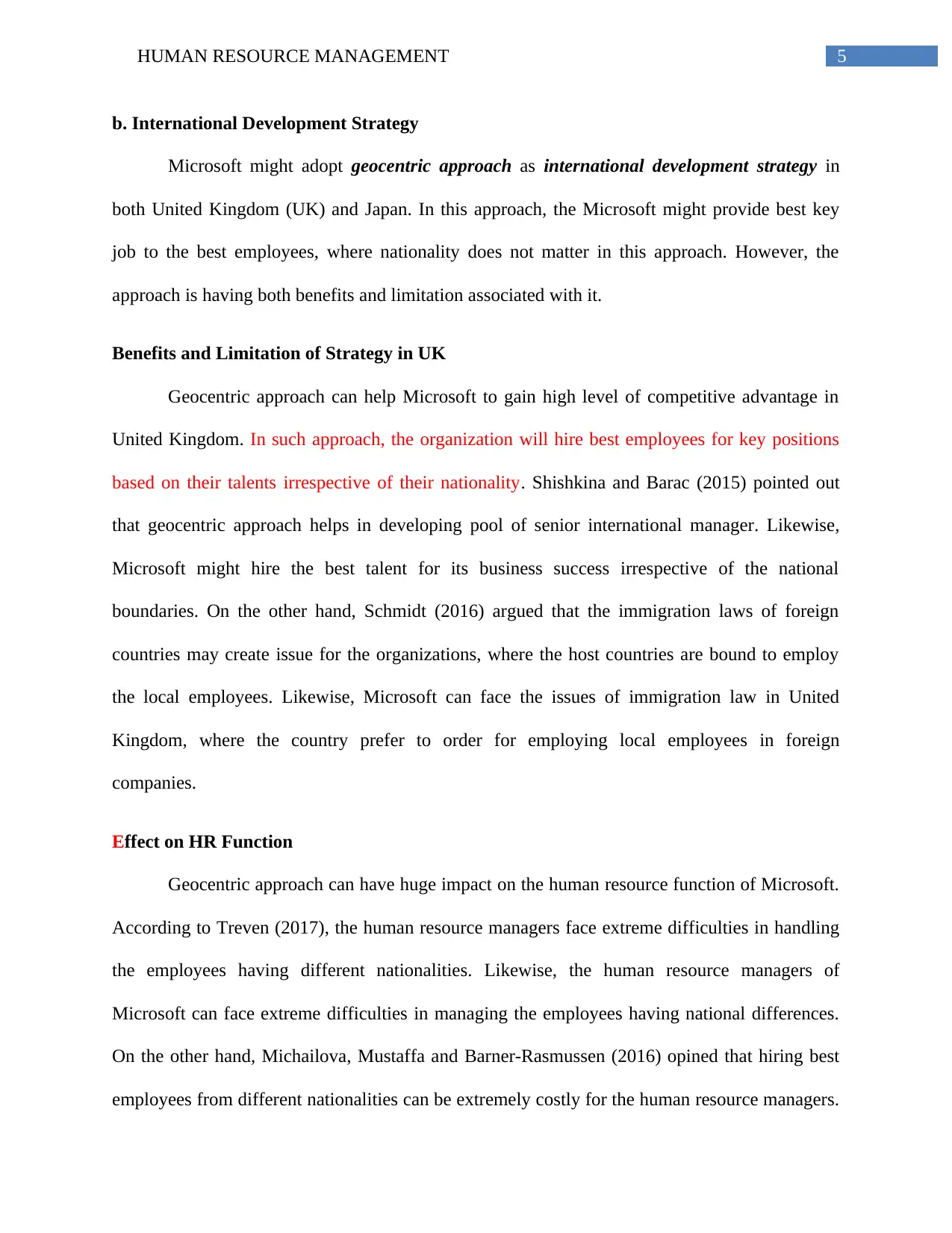
5HUMAN RESOURCE MANAGEMENT
b. International Development Strategy
Microsoft might adopt geocentric approach as international development strategy in
both United Kingdom (UK) and Japan. In this approach, the Microsoft might provide best key
job to the best employees, where nationality does not matter in this approach. However, the
approach is having both benefits and limitation associated with it.
Benefits and Limitation of Strategy in UK
Geocentric approach can help Microsoft to gain high level of competitive advantage in
United Kingdom. In such approach, the organization will hire best employees for key positions
based on their talents irrespective of their nationality. Shishkina and Barac (2015) pointed out
that geocentric approach helps in developing pool of senior international manager. Likewise,
Microsoft might hire the best talent for its business success irrespective of the national
boundaries. On the other hand, Schmidt (2016) argued that the immigration laws of foreign
countries may create issue for the organizations, where the host countries are bound to employ
the local employees. Likewise, Microsoft can face the issues of immigration law in United
Kingdom, where the country prefer to order for employing local employees in foreign
companies.
Effect on HR Function
Geocentric approach can have huge impact on the human resource function of Microsoft.
According to Treven (2017), the human resource managers face extreme difficulties in handling
the employees having different nationalities. Likewise, the human resource managers of
Microsoft can face extreme difficulties in managing the employees having national differences.
On the other hand, Michailova, Mustaffa and Barner-Rasmussen (2016) opined that hiring best
employees from different nationalities can be extremely costly for the human resource managers.
b. International Development Strategy
Microsoft might adopt geocentric approach as international development strategy in
both United Kingdom (UK) and Japan. In this approach, the Microsoft might provide best key
job to the best employees, where nationality does not matter in this approach. However, the
approach is having both benefits and limitation associated with it.
Benefits and Limitation of Strategy in UK
Geocentric approach can help Microsoft to gain high level of competitive advantage in
United Kingdom. In such approach, the organization will hire best employees for key positions
based on their talents irrespective of their nationality. Shishkina and Barac (2015) pointed out
that geocentric approach helps in developing pool of senior international manager. Likewise,
Microsoft might hire the best talent for its business success irrespective of the national
boundaries. On the other hand, Schmidt (2016) argued that the immigration laws of foreign
countries may create issue for the organizations, where the host countries are bound to employ
the local employees. Likewise, Microsoft can face the issues of immigration law in United
Kingdom, where the country prefer to order for employing local employees in foreign
companies.
Effect on HR Function
Geocentric approach can have huge impact on the human resource function of Microsoft.
According to Treven (2017), the human resource managers face extreme difficulties in handling
the employees having different nationalities. Likewise, the human resource managers of
Microsoft can face extreme difficulties in managing the employees having national differences.
On the other hand, Michailova, Mustaffa and Barner-Rasmussen (2016) opined that hiring best
employees from different nationalities can be extremely costly for the human resource managers.
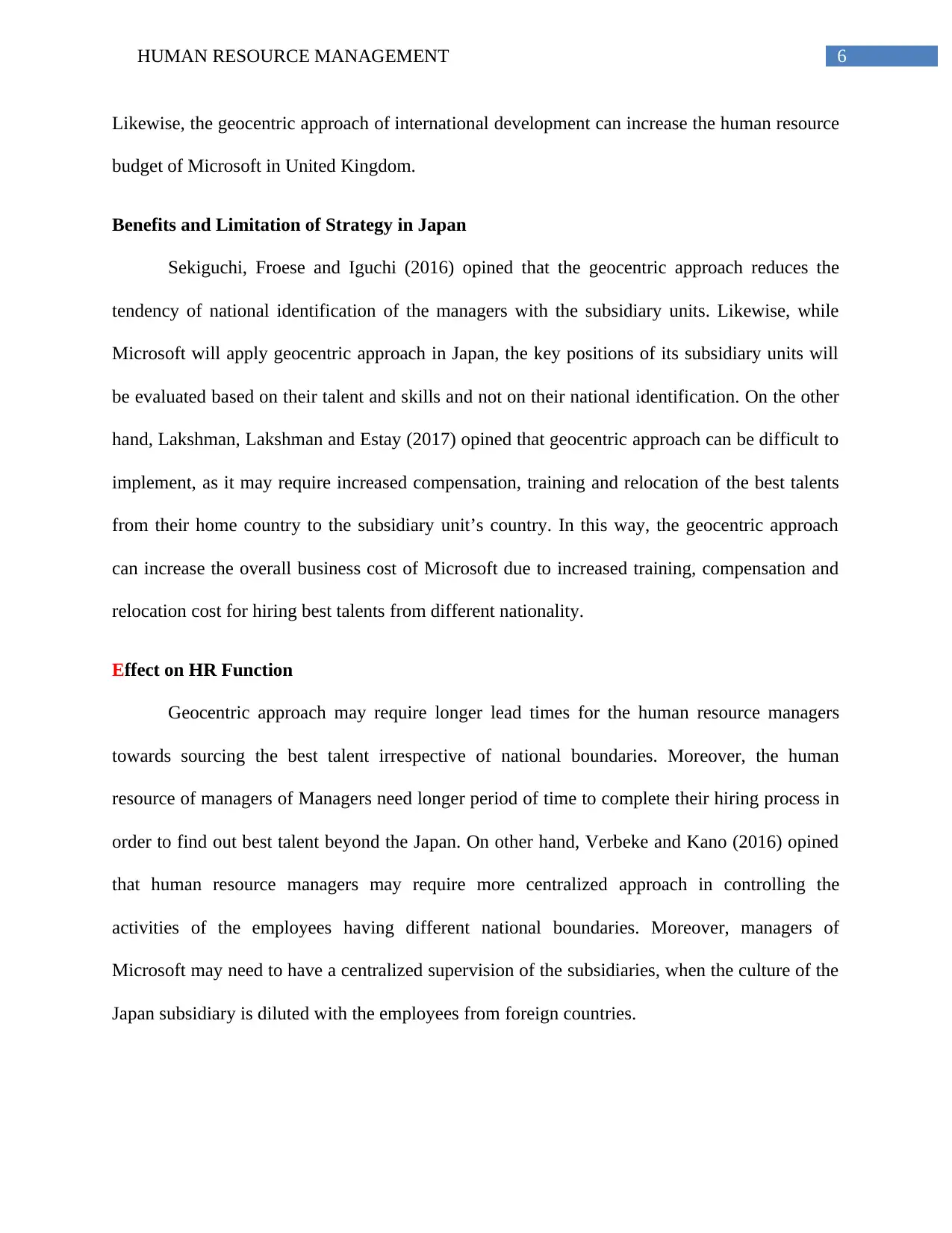
6HUMAN RESOURCE MANAGEMENT
Likewise, the geocentric approach of international development can increase the human resource
budget of Microsoft in United Kingdom.
Benefits and Limitation of Strategy in Japan
Sekiguchi, Froese and Iguchi (2016) opined that the geocentric approach reduces the
tendency of national identification of the managers with the subsidiary units. Likewise, while
Microsoft will apply geocentric approach in Japan, the key positions of its subsidiary units will
be evaluated based on their talent and skills and not on their national identification. On the other
hand, Lakshman, Lakshman and Estay (2017) opined that geocentric approach can be difficult to
implement, as it may require increased compensation, training and relocation of the best talents
from their home country to the subsidiary unit’s country. In this way, the geocentric approach
can increase the overall business cost of Microsoft due to increased training, compensation and
relocation cost for hiring best talents from different nationality.
Effect on HR Function
Geocentric approach may require longer lead times for the human resource managers
towards sourcing the best talent irrespective of national boundaries. Moreover, the human
resource of managers of Managers need longer period of time to complete their hiring process in
order to find out best talent beyond the Japan. On other hand, Verbeke and Kano (2016) opined
that human resource managers may require more centralized approach in controlling the
activities of the employees having different national boundaries. Moreover, managers of
Microsoft may need to have a centralized supervision of the subsidiaries, when the culture of the
Japan subsidiary is diluted with the employees from foreign countries.
Likewise, the geocentric approach of international development can increase the human resource
budget of Microsoft in United Kingdom.
Benefits and Limitation of Strategy in Japan
Sekiguchi, Froese and Iguchi (2016) opined that the geocentric approach reduces the
tendency of national identification of the managers with the subsidiary units. Likewise, while
Microsoft will apply geocentric approach in Japan, the key positions of its subsidiary units will
be evaluated based on their talent and skills and not on their national identification. On the other
hand, Lakshman, Lakshman and Estay (2017) opined that geocentric approach can be difficult to
implement, as it may require increased compensation, training and relocation of the best talents
from their home country to the subsidiary unit’s country. In this way, the geocentric approach
can increase the overall business cost of Microsoft due to increased training, compensation and
relocation cost for hiring best talents from different nationality.
Effect on HR Function
Geocentric approach may require longer lead times for the human resource managers
towards sourcing the best talent irrespective of national boundaries. Moreover, the human
resource of managers of Managers need longer period of time to complete their hiring process in
order to find out best talent beyond the Japan. On other hand, Verbeke and Kano (2016) opined
that human resource managers may require more centralized approach in controlling the
activities of the employees having different national boundaries. Moreover, managers of
Microsoft may need to have a centralized supervision of the subsidiaries, when the culture of the
Japan subsidiary is diluted with the employees from foreign countries.
Paraphrase This Document
Need a fresh take? Get an instant paraphrase of this document with our AI Paraphraser
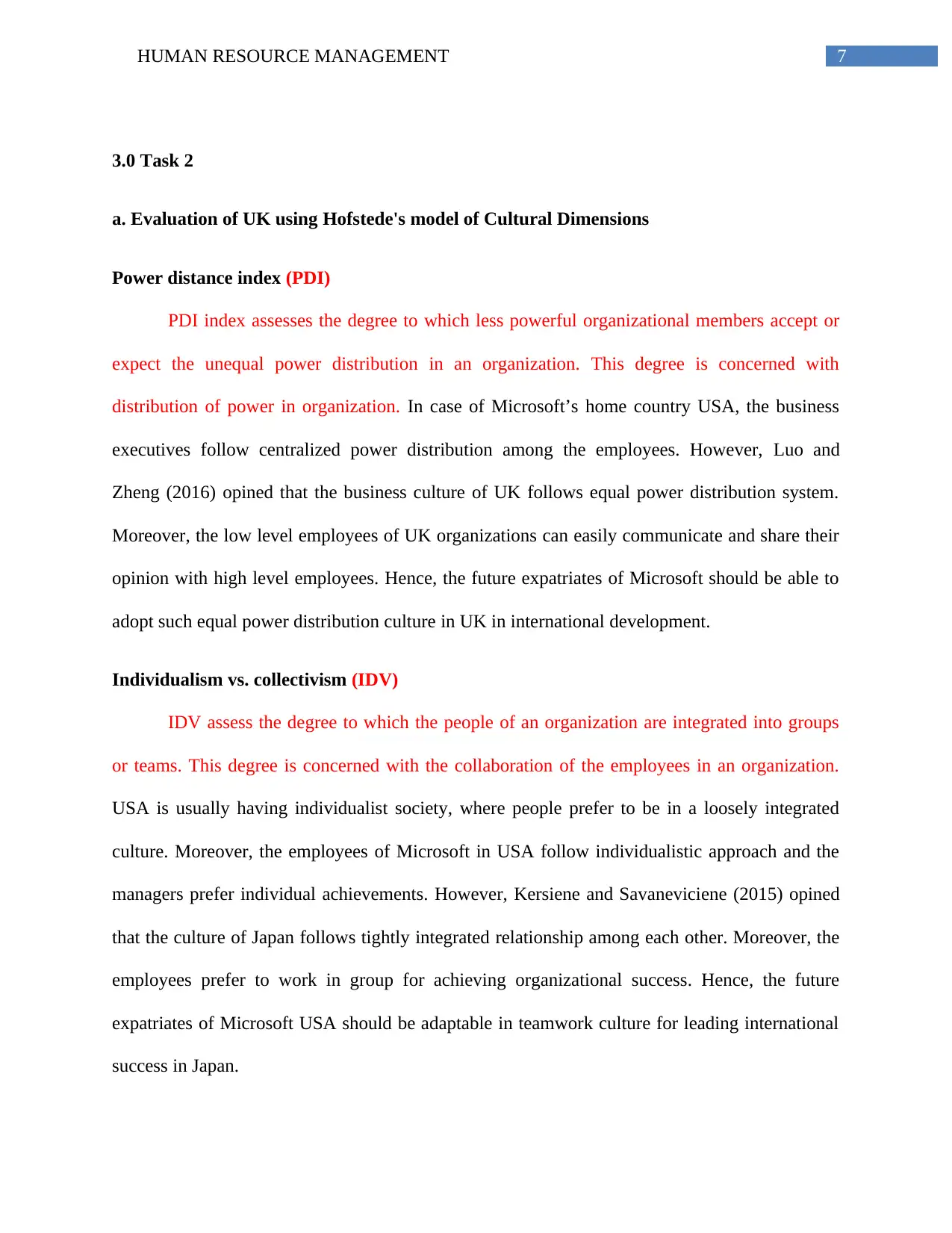
7HUMAN RESOURCE MANAGEMENT
3.0 Task 2
a. Evaluation of UK using Hofstede's model of Cultural Dimensions
Power distance index (PDI)
PDI index assesses the degree to which less powerful organizational members accept or
expect the unequal power distribution in an organization. This degree is concerned with
distribution of power in organization. In case of Microsoft’s home country USA, the business
executives follow centralized power distribution among the employees. However, Luo and
Zheng (2016) opined that the business culture of UK follows equal power distribution system.
Moreover, the low level employees of UK organizations can easily communicate and share their
opinion with high level employees. Hence, the future expatriates of Microsoft should be able to
adopt such equal power distribution culture in UK in international development.
Individualism vs. collectivism (IDV)
IDV assess the degree to which the people of an organization are integrated into groups
or teams. This degree is concerned with the collaboration of the employees in an organization.
USA is usually having individualist society, where people prefer to be in a loosely integrated
culture. Moreover, the employees of Microsoft in USA follow individualistic approach and the
managers prefer individual achievements. However, Kersiene and Savaneviciene (2015) opined
that the culture of Japan follows tightly integrated relationship among each other. Moreover, the
employees prefer to work in group for achieving organizational success. Hence, the future
expatriates of Microsoft USA should be adaptable in teamwork culture for leading international
success in Japan.
3.0 Task 2
a. Evaluation of UK using Hofstede's model of Cultural Dimensions
Power distance index (PDI)
PDI index assesses the degree to which less powerful organizational members accept or
expect the unequal power distribution in an organization. This degree is concerned with
distribution of power in organization. In case of Microsoft’s home country USA, the business
executives follow centralized power distribution among the employees. However, Luo and
Zheng (2016) opined that the business culture of UK follows equal power distribution system.
Moreover, the low level employees of UK organizations can easily communicate and share their
opinion with high level employees. Hence, the future expatriates of Microsoft should be able to
adopt such equal power distribution culture in UK in international development.
Individualism vs. collectivism (IDV)
IDV assess the degree to which the people of an organization are integrated into groups
or teams. This degree is concerned with the collaboration of the employees in an organization.
USA is usually having individualist society, where people prefer to be in a loosely integrated
culture. Moreover, the employees of Microsoft in USA follow individualistic approach and the
managers prefer individual achievements. However, Kersiene and Savaneviciene (2015) opined
that the culture of Japan follows tightly integrated relationship among each other. Moreover, the
employees prefer to work in group for achieving organizational success. Hence, the future
expatriates of Microsoft USA should be adaptable in teamwork culture for leading international
success in Japan.

8HUMAN RESOURCE MANAGEMENT
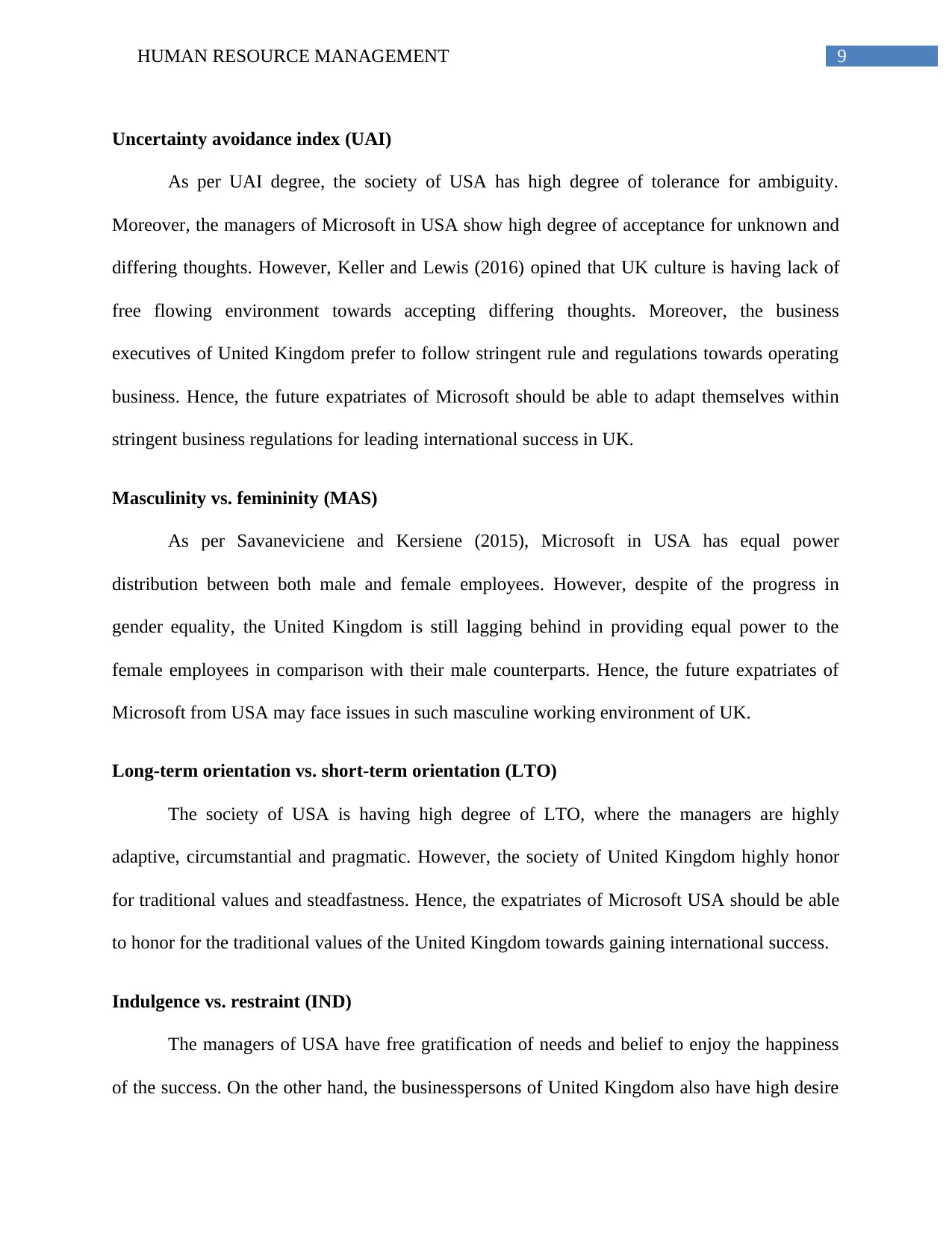
9HUMAN RESOURCE MANAGEMENT
Uncertainty avoidance index (UAI)
As per UAI degree, the society of USA has high degree of tolerance for ambiguity.
Moreover, the managers of Microsoft in USA show high degree of acceptance for unknown and
differing thoughts. However, Keller and Lewis (2016) opined that UK culture is having lack of
free flowing environment towards accepting differing thoughts. Moreover, the business
executives of United Kingdom prefer to follow stringent rule and regulations towards operating
business. Hence, the future expatriates of Microsoft should be able to adapt themselves within
stringent business regulations for leading international success in UK.
Masculinity vs. femininity (MAS)
As per Savaneviciene and Kersiene (2015), Microsoft in USA has equal power
distribution between both male and female employees. However, despite of the progress in
gender equality, the United Kingdom is still lagging behind in providing equal power to the
female employees in comparison with their male counterparts. Hence, the future expatriates of
Microsoft from USA may face issues in such masculine working environment of UK.
Long-term orientation vs. short-term orientation (LTO)
The society of USA is having high degree of LTO, where the managers are highly
adaptive, circumstantial and pragmatic. However, the society of United Kingdom highly honor
for traditional values and steadfastness. Hence, the expatriates of Microsoft USA should be able
to honor for the traditional values of the United Kingdom towards gaining international success.
Indulgence vs. restraint (IND)
The managers of USA have free gratification of needs and belief to enjoy the happiness
of the success. On the other hand, the businesspersons of United Kingdom also have high desire
Uncertainty avoidance index (UAI)
As per UAI degree, the society of USA has high degree of tolerance for ambiguity.
Moreover, the managers of Microsoft in USA show high degree of acceptance for unknown and
differing thoughts. However, Keller and Lewis (2016) opined that UK culture is having lack of
free flowing environment towards accepting differing thoughts. Moreover, the business
executives of United Kingdom prefer to follow stringent rule and regulations towards operating
business. Hence, the future expatriates of Microsoft should be able to adapt themselves within
stringent business regulations for leading international success in UK.
Masculinity vs. femininity (MAS)
As per Savaneviciene and Kersiene (2015), Microsoft in USA has equal power
distribution between both male and female employees. However, despite of the progress in
gender equality, the United Kingdom is still lagging behind in providing equal power to the
female employees in comparison with their male counterparts. Hence, the future expatriates of
Microsoft from USA may face issues in such masculine working environment of UK.
Long-term orientation vs. short-term orientation (LTO)
The society of USA is having high degree of LTO, where the managers are highly
adaptive, circumstantial and pragmatic. However, the society of United Kingdom highly honor
for traditional values and steadfastness. Hence, the expatriates of Microsoft USA should be able
to honor for the traditional values of the United Kingdom towards gaining international success.
Indulgence vs. restraint (IND)
The managers of USA have free gratification of needs and belief to enjoy the happiness
of the success. On the other hand, the businesspersons of United Kingdom also have high desire
Secure Best Marks with AI Grader
Need help grading? Try our AI Grader for instant feedback on your assignments.
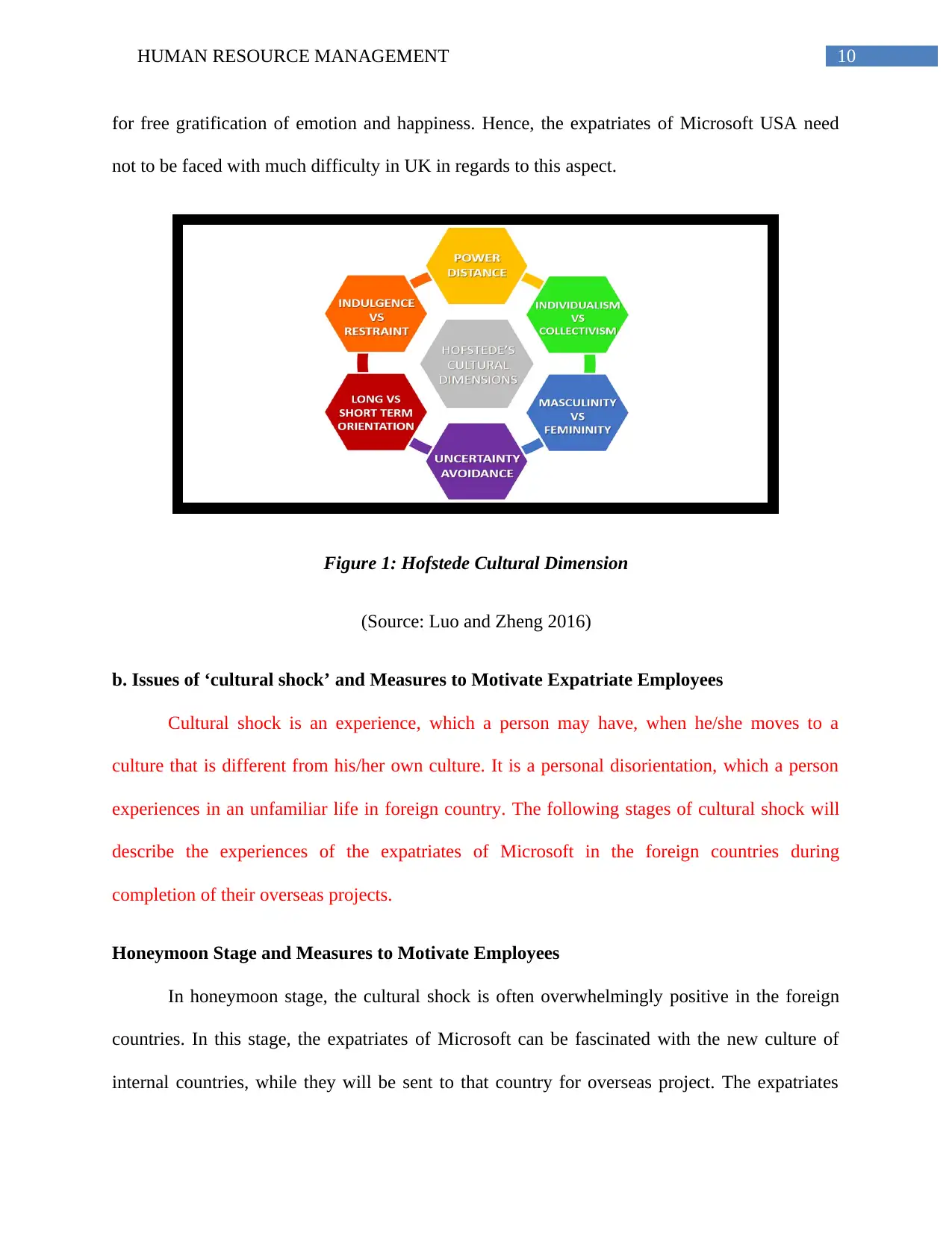
10HUMAN RESOURCE MANAGEMENT
for free gratification of emotion and happiness. Hence, the expatriates of Microsoft USA need
not to be faced with much difficulty in UK in regards to this aspect.
Figure 1: Hofstede Cultural Dimension
(Source: Luo and Zheng 2016)
b. Issues of ‘cultural shock’ and Measures to Motivate Expatriate Employees
Cultural shock is an experience, which a person may have, when he/she moves to a
culture that is different from his/her own culture. It is a personal disorientation, which a person
experiences in an unfamiliar life in foreign country. The following stages of cultural shock will
describe the experiences of the expatriates of Microsoft in the foreign countries during
completion of their overseas projects.
Honeymoon Stage and Measures to Motivate Employees
In honeymoon stage, the cultural shock is often overwhelmingly positive in the foreign
countries. In this stage, the expatriates of Microsoft can be fascinated with the new culture of
internal countries, while they will be sent to that country for overseas project. The expatriates
for free gratification of emotion and happiness. Hence, the expatriates of Microsoft USA need
not to be faced with much difficulty in UK in regards to this aspect.
Figure 1: Hofstede Cultural Dimension
(Source: Luo and Zheng 2016)
b. Issues of ‘cultural shock’ and Measures to Motivate Expatriate Employees
Cultural shock is an experience, which a person may have, when he/she moves to a
culture that is different from his/her own culture. It is a personal disorientation, which a person
experiences in an unfamiliar life in foreign country. The following stages of cultural shock will
describe the experiences of the expatriates of Microsoft in the foreign countries during
completion of their overseas projects.
Honeymoon Stage and Measures to Motivate Employees
In honeymoon stage, the cultural shock is often overwhelmingly positive in the foreign
countries. In this stage, the expatriates of Microsoft can be fascinated with the new culture of
internal countries, while they will be sent to that country for overseas project. The expatriates
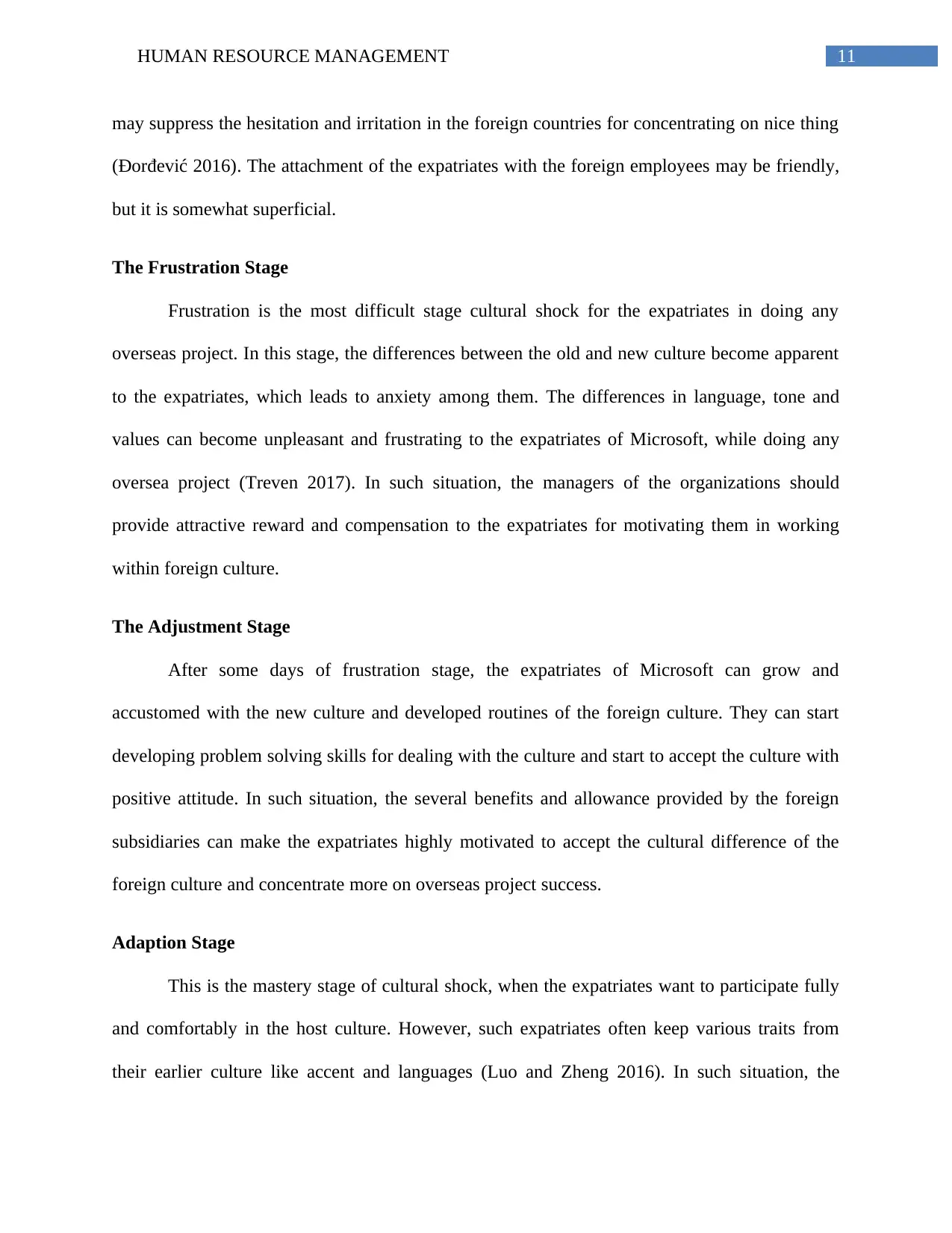
11HUMAN RESOURCE MANAGEMENT
may suppress the hesitation and irritation in the foreign countries for concentrating on nice thing
(Đorđević 2016). The attachment of the expatriates with the foreign employees may be friendly,
but it is somewhat superficial.
The Frustration Stage
Frustration is the most difficult stage cultural shock for the expatriates in doing any
overseas project. In this stage, the differences between the old and new culture become apparent
to the expatriates, which leads to anxiety among them. The differences in language, tone and
values can become unpleasant and frustrating to the expatriates of Microsoft, while doing any
oversea project (Treven 2017). In such situation, the managers of the organizations should
provide attractive reward and compensation to the expatriates for motivating them in working
within foreign culture.
The Adjustment Stage
After some days of frustration stage, the expatriates of Microsoft can grow and
accustomed with the new culture and developed routines of the foreign culture. They can start
developing problem solving skills for dealing with the culture and start to accept the culture with
positive attitude. In such situation, the several benefits and allowance provided by the foreign
subsidiaries can make the expatriates highly motivated to accept the cultural difference of the
foreign culture and concentrate more on overseas project success.
Adaption Stage
This is the mastery stage of cultural shock, when the expatriates want to participate fully
and comfortably in the host culture. However, such expatriates often keep various traits from
their earlier culture like accent and languages (Luo and Zheng 2016). In such situation, the
may suppress the hesitation and irritation in the foreign countries for concentrating on nice thing
(Đorđević 2016). The attachment of the expatriates with the foreign employees may be friendly,
but it is somewhat superficial.
The Frustration Stage
Frustration is the most difficult stage cultural shock for the expatriates in doing any
overseas project. In this stage, the differences between the old and new culture become apparent
to the expatriates, which leads to anxiety among them. The differences in language, tone and
values can become unpleasant and frustrating to the expatriates of Microsoft, while doing any
oversea project (Treven 2017). In such situation, the managers of the organizations should
provide attractive reward and compensation to the expatriates for motivating them in working
within foreign culture.
The Adjustment Stage
After some days of frustration stage, the expatriates of Microsoft can grow and
accustomed with the new culture and developed routines of the foreign culture. They can start
developing problem solving skills for dealing with the culture and start to accept the culture with
positive attitude. In such situation, the several benefits and allowance provided by the foreign
subsidiaries can make the expatriates highly motivated to accept the cultural difference of the
foreign culture and concentrate more on overseas project success.
Adaption Stage
This is the mastery stage of cultural shock, when the expatriates want to participate fully
and comfortably in the host culture. However, such expatriates often keep various traits from
their earlier culture like accent and languages (Luo and Zheng 2016). In such situation, the
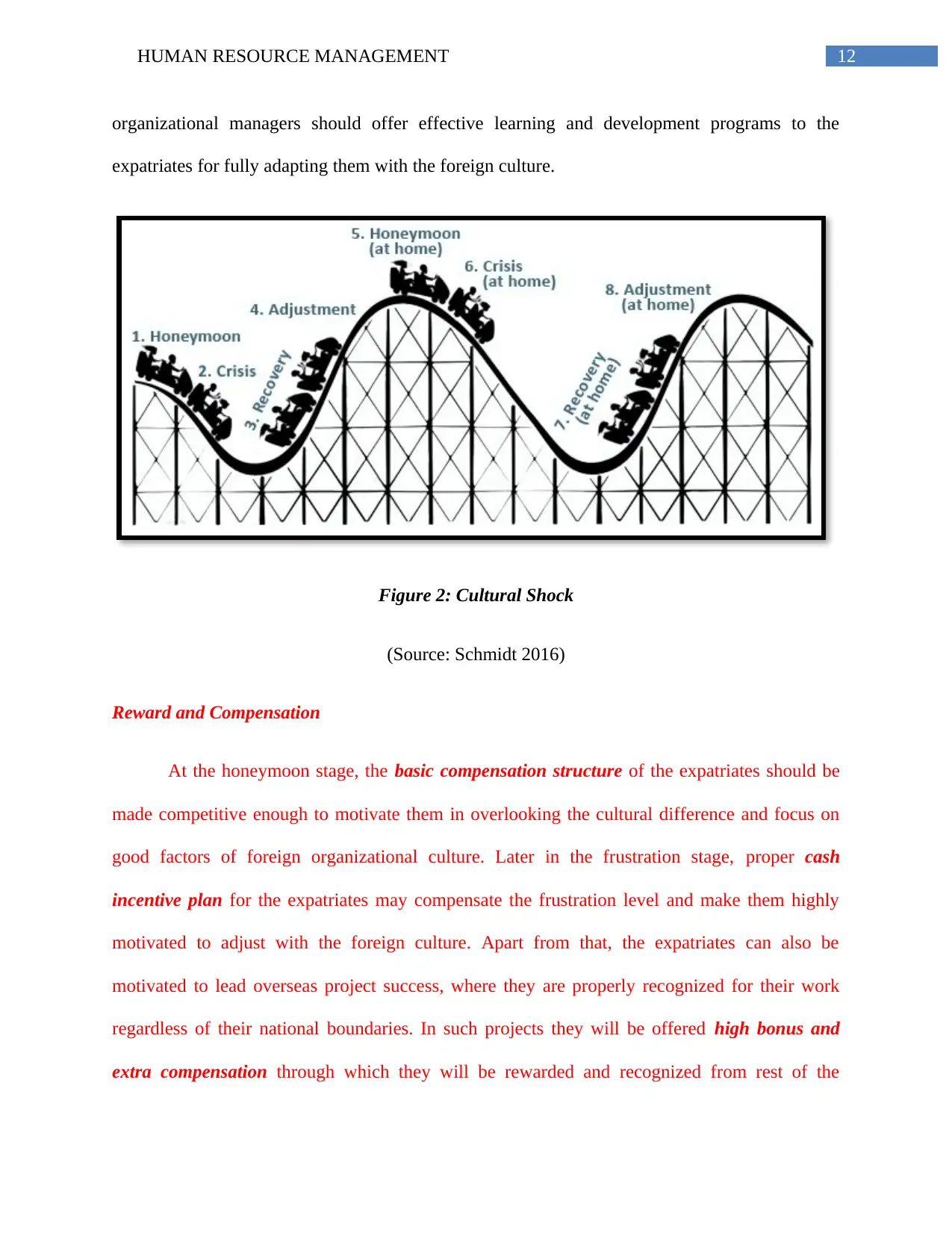
12HUMAN RESOURCE MANAGEMENT
organizational managers should offer effective learning and development programs to the
expatriates for fully adapting them with the foreign culture.
Figure 2: Cultural Shock
(Source: Schmidt 2016)
Reward and Compensation
At the honeymoon stage, the basic compensation structure of the expatriates should be
made competitive enough to motivate them in overlooking the cultural difference and focus on
good factors of foreign organizational culture. Later in the frustration stage, proper cash
incentive plan for the expatriates may compensate the frustration level and make them highly
motivated to adjust with the foreign culture. Apart from that, the expatriates can also be
motivated to lead overseas project success, where they are properly recognized for their work
regardless of their national boundaries. In such projects they will be offered high bonus and
extra compensation through which they will be rewarded and recognized from rest of the
organizational managers should offer effective learning and development programs to the
expatriates for fully adapting them with the foreign culture.
Figure 2: Cultural Shock
(Source: Schmidt 2016)
Reward and Compensation
At the honeymoon stage, the basic compensation structure of the expatriates should be
made competitive enough to motivate them in overlooking the cultural difference and focus on
good factors of foreign organizational culture. Later in the frustration stage, proper cash
incentive plan for the expatriates may compensate the frustration level and make them highly
motivated to adjust with the foreign culture. Apart from that, the expatriates can also be
motivated to lead overseas project success, where they are properly recognized for their work
regardless of their national boundaries. In such projects they will be offered high bonus and
extra compensation through which they will be rewarded and recognized from rest of the
Paraphrase This Document
Need a fresh take? Get an instant paraphrase of this document with our AI Paraphraser
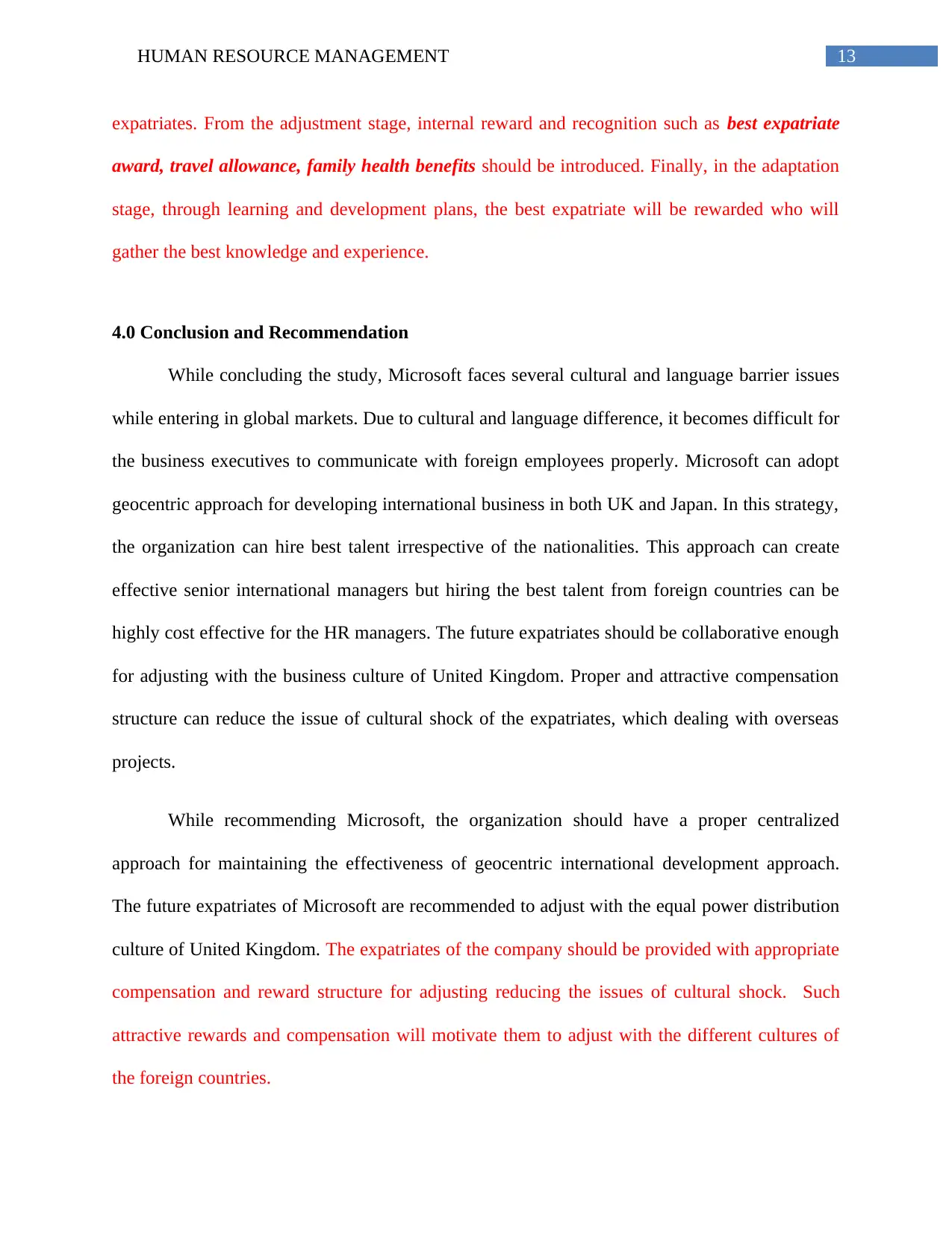
13HUMAN RESOURCE MANAGEMENT
expatriates. From the adjustment stage, internal reward and recognition such as best expatriate
award, travel allowance, family health benefits should be introduced. Finally, in the adaptation
stage, through learning and development plans, the best expatriate will be rewarded who will
gather the best knowledge and experience.
4.0 Conclusion and Recommendation
While concluding the study, Microsoft faces several cultural and language barrier issues
while entering in global markets. Due to cultural and language difference, it becomes difficult for
the business executives to communicate with foreign employees properly. Microsoft can adopt
geocentric approach for developing international business in both UK and Japan. In this strategy,
the organization can hire best talent irrespective of the nationalities. This approach can create
effective senior international managers but hiring the best talent from foreign countries can be
highly cost effective for the HR managers. The future expatriates should be collaborative enough
for adjusting with the business culture of United Kingdom. Proper and attractive compensation
structure can reduce the issue of cultural shock of the expatriates, which dealing with overseas
projects.
While recommending Microsoft, the organization should have a proper centralized
approach for maintaining the effectiveness of geocentric international development approach.
The future expatriates of Microsoft are recommended to adjust with the equal power distribution
culture of United Kingdom. The expatriates of the company should be provided with appropriate
compensation and reward structure for adjusting reducing the issues of cultural shock. Such
attractive rewards and compensation will motivate them to adjust with the different cultures of
the foreign countries.
expatriates. From the adjustment stage, internal reward and recognition such as best expatriate
award, travel allowance, family health benefits should be introduced. Finally, in the adaptation
stage, through learning and development plans, the best expatriate will be rewarded who will
gather the best knowledge and experience.
4.0 Conclusion and Recommendation
While concluding the study, Microsoft faces several cultural and language barrier issues
while entering in global markets. Due to cultural and language difference, it becomes difficult for
the business executives to communicate with foreign employees properly. Microsoft can adopt
geocentric approach for developing international business in both UK and Japan. In this strategy,
the organization can hire best talent irrespective of the nationalities. This approach can create
effective senior international managers but hiring the best talent from foreign countries can be
highly cost effective for the HR managers. The future expatriates should be collaborative enough
for adjusting with the business culture of United Kingdom. Proper and attractive compensation
structure can reduce the issue of cultural shock of the expatriates, which dealing with overseas
projects.
While recommending Microsoft, the organization should have a proper centralized
approach for maintaining the effectiveness of geocentric international development approach.
The future expatriates of Microsoft are recommended to adjust with the equal power distribution
culture of United Kingdom. The expatriates of the company should be provided with appropriate
compensation and reward structure for adjusting reducing the issues of cultural shock. Such
attractive rewards and compensation will motivate them to adjust with the different cultures of
the foreign countries.
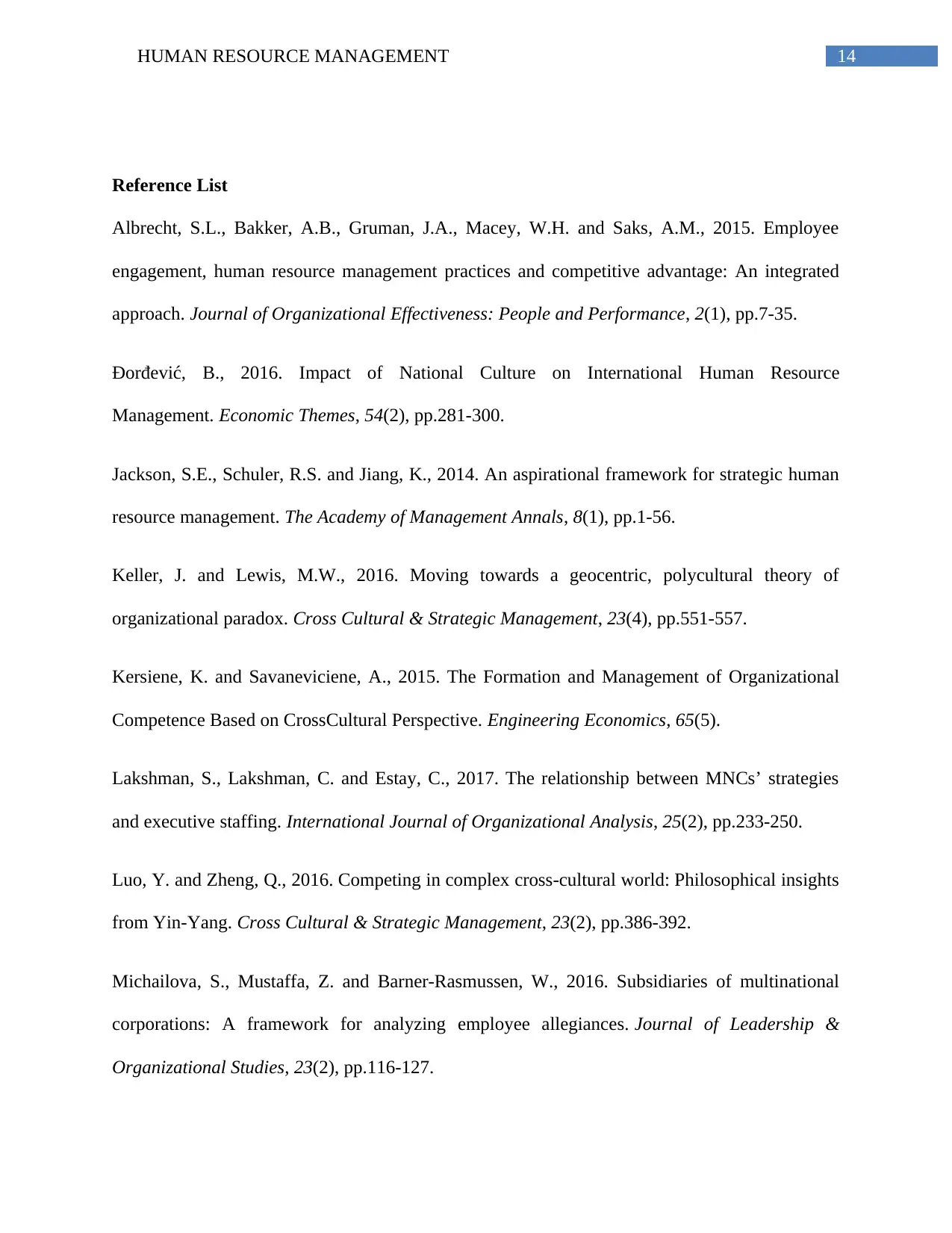
14HUMAN RESOURCE MANAGEMENT
Reference List
Albrecht, S.L., Bakker, A.B., Gruman, J.A., Macey, W.H. and Saks, A.M., 2015. Employee
engagement, human resource management practices and competitive advantage: An integrated
approach. Journal of Organizational Effectiveness: People and Performance, 2(1), pp.7-35.
Đorđević, B., 2016. Impact of National Culture on International Human Resource
Management. Economic Themes, 54(2), pp.281-300.
Jackson, S.E., Schuler, R.S. and Jiang, K., 2014. An aspirational framework for strategic human
resource management. The Academy of Management Annals, 8(1), pp.1-56.
Keller, J. and Lewis, M.W., 2016. Moving towards a geocentric, polycultural theory of
organizational paradox. Cross Cultural & Strategic Management, 23(4), pp.551-557.
Kersiene, K. and Savaneviciene, A., 2015. The Formation and Management of Organizational
Competence Based on CrossCultural Perspective. Engineering Economics, 65(5).
Lakshman, S., Lakshman, C. and Estay, C., 2017. The relationship between MNCs’ strategies
and executive staffing. International Journal of Organizational Analysis, 25(2), pp.233-250.
Luo, Y. and Zheng, Q., 2016. Competing in complex cross-cultural world: Philosophical insights
from Yin-Yang. Cross Cultural & Strategic Management, 23(2), pp.386-392.
Michailova, S., Mustaffa, Z. and Barner-Rasmussen, W., 2016. Subsidiaries of multinational
corporations: A framework for analyzing employee allegiances. Journal of Leadership &
Organizational Studies, 23(2), pp.116-127.
Reference List
Albrecht, S.L., Bakker, A.B., Gruman, J.A., Macey, W.H. and Saks, A.M., 2015. Employee
engagement, human resource management practices and competitive advantage: An integrated
approach. Journal of Organizational Effectiveness: People and Performance, 2(1), pp.7-35.
Đorđević, B., 2016. Impact of National Culture on International Human Resource
Management. Economic Themes, 54(2), pp.281-300.
Jackson, S.E., Schuler, R.S. and Jiang, K., 2014. An aspirational framework for strategic human
resource management. The Academy of Management Annals, 8(1), pp.1-56.
Keller, J. and Lewis, M.W., 2016. Moving towards a geocentric, polycultural theory of
organizational paradox. Cross Cultural & Strategic Management, 23(4), pp.551-557.
Kersiene, K. and Savaneviciene, A., 2015. The Formation and Management of Organizational
Competence Based on CrossCultural Perspective. Engineering Economics, 65(5).
Lakshman, S., Lakshman, C. and Estay, C., 2017. The relationship between MNCs’ strategies
and executive staffing. International Journal of Organizational Analysis, 25(2), pp.233-250.
Luo, Y. and Zheng, Q., 2016. Competing in complex cross-cultural world: Philosophical insights
from Yin-Yang. Cross Cultural & Strategic Management, 23(2), pp.386-392.
Michailova, S., Mustaffa, Z. and Barner-Rasmussen, W., 2016. Subsidiaries of multinational
corporations: A framework for analyzing employee allegiances. Journal of Leadership &
Organizational Studies, 23(2), pp.116-127.
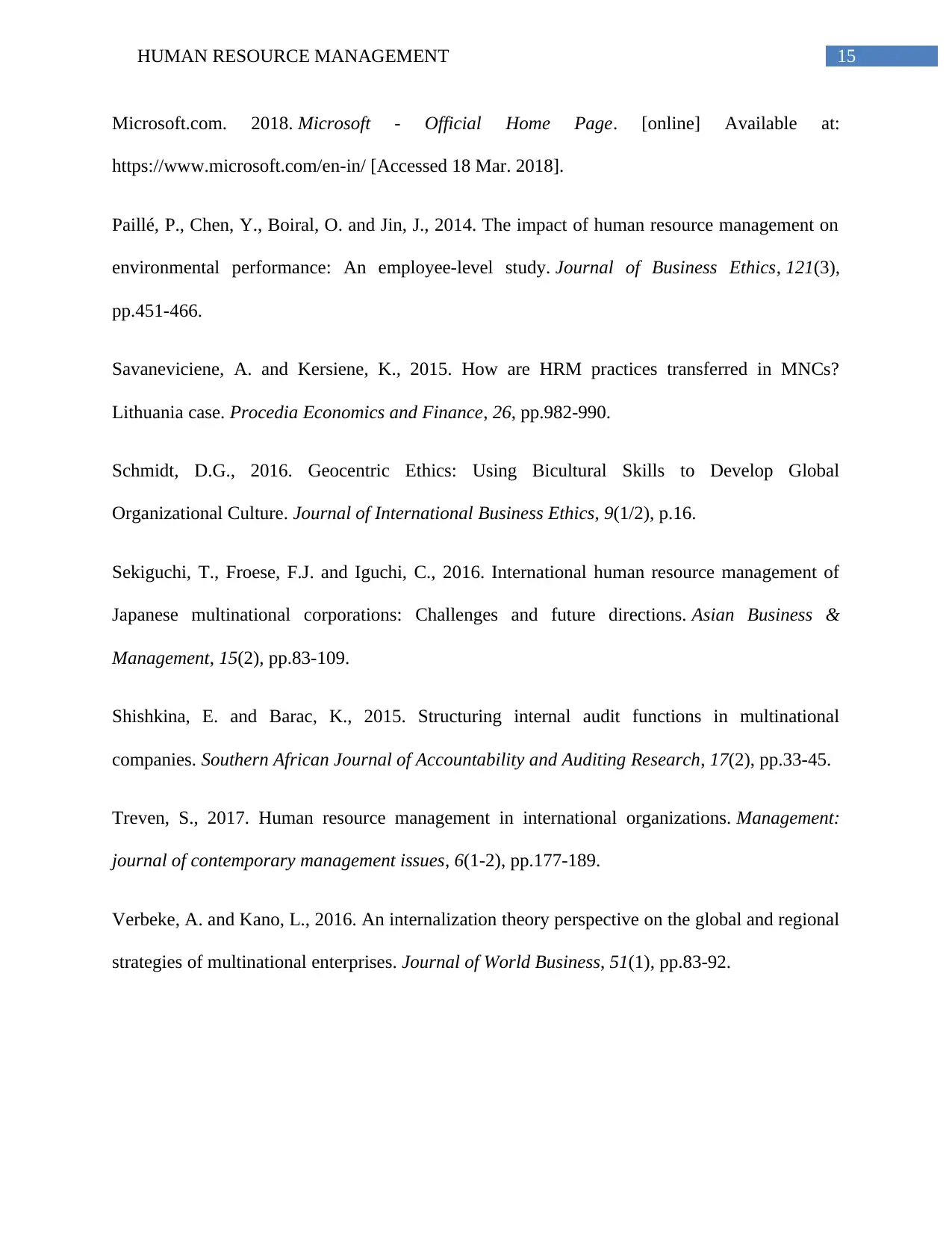
15HUMAN RESOURCE MANAGEMENT
Microsoft.com. 2018. Microsoft - Official Home Page. [online] Available at:
https://www.microsoft.com/en-in/ [Accessed 18 Mar. 2018].
Paillé, P., Chen, Y., Boiral, O. and Jin, J., 2014. The impact of human resource management on
environmental performance: An employee-level study. Journal of Business Ethics, 121(3),
pp.451-466.
Savaneviciene, A. and Kersiene, K., 2015. How are HRM practices transferred in MNCs?
Lithuania case. Procedia Economics and Finance, 26, pp.982-990.
Schmidt, D.G., 2016. Geocentric Ethics: Using Bicultural Skills to Develop Global
Organizational Culture. Journal of International Business Ethics, 9(1/2), p.16.
Sekiguchi, T., Froese, F.J. and Iguchi, C., 2016. International human resource management of
Japanese multinational corporations: Challenges and future directions. Asian Business &
Management, 15(2), pp.83-109.
Shishkina, E. and Barac, K., 2015. Structuring internal audit functions in multinational
companies. Southern African Journal of Accountability and Auditing Research, 17(2), pp.33-45.
Treven, S., 2017. Human resource management in international organizations. Management:
journal of contemporary management issues, 6(1-2), pp.177-189.
Verbeke, A. and Kano, L., 2016. An internalization theory perspective on the global and regional
strategies of multinational enterprises. Journal of World Business, 51(1), pp.83-92.
Microsoft.com. 2018. Microsoft - Official Home Page. [online] Available at:
https://www.microsoft.com/en-in/ [Accessed 18 Mar. 2018].
Paillé, P., Chen, Y., Boiral, O. and Jin, J., 2014. The impact of human resource management on
environmental performance: An employee-level study. Journal of Business Ethics, 121(3),
pp.451-466.
Savaneviciene, A. and Kersiene, K., 2015. How are HRM practices transferred in MNCs?
Lithuania case. Procedia Economics and Finance, 26, pp.982-990.
Schmidt, D.G., 2016. Geocentric Ethics: Using Bicultural Skills to Develop Global
Organizational Culture. Journal of International Business Ethics, 9(1/2), p.16.
Sekiguchi, T., Froese, F.J. and Iguchi, C., 2016. International human resource management of
Japanese multinational corporations: Challenges and future directions. Asian Business &
Management, 15(2), pp.83-109.
Shishkina, E. and Barac, K., 2015. Structuring internal audit functions in multinational
companies. Southern African Journal of Accountability and Auditing Research, 17(2), pp.33-45.
Treven, S., 2017. Human resource management in international organizations. Management:
journal of contemporary management issues, 6(1-2), pp.177-189.
Verbeke, A. and Kano, L., 2016. An internalization theory perspective on the global and regional
strategies of multinational enterprises. Journal of World Business, 51(1), pp.83-92.
1 out of 16
Related Documents
Your All-in-One AI-Powered Toolkit for Academic Success.
+13062052269
info@desklib.com
Available 24*7 on WhatsApp / Email
![[object Object]](/_next/static/media/star-bottom.7253800d.svg)
Unlock your academic potential
© 2024 | Zucol Services PVT LTD | All rights reserved.





